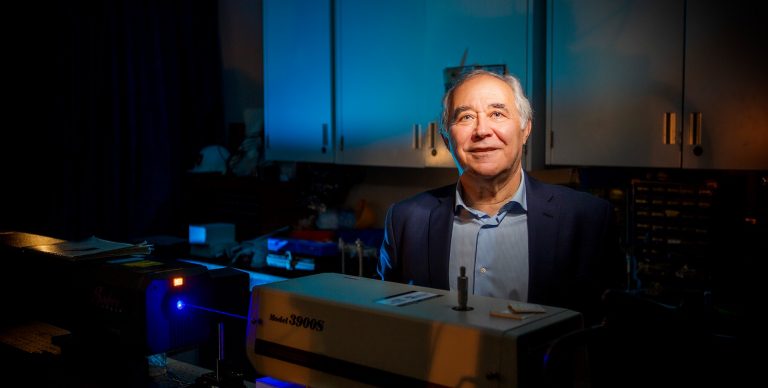Celebrated chemistry prof John A. Capobianco to retire after 4 decades at Concordia

John A. Capobianco, distinguished University Research Professor in the Department of Chemistry and Biochemistry and honorary Concordia University Research Chair in Nanoscience, will retire at the end of this month.
A longstanding member of the Faculty of Arts and Science, Capobianco has occupied several academic leadership positions over the years. As a former Vice Dean of Research and International Relations and Associate Dean of Planning and Academic Facilities, he facilitated advancements to Concordia’s research and infrastructure. He is also responsible for establishing a groundbreaking research program in nanoscience, the Lanthanide Research Group (LRG).
Improving drug delivery through nanoparticle technology
Capobianco has been teaching inorganic chemistry and modern spectroscopy techniques in at Concordia since 1986.
In his first year, he founded the LRG, which has developed potential applications for targeting disease, as well as new diagnostic and therapeutic agents. His group has also contributed to the foundational understanding of lanthanide luminescence.
In the late 1990s, the LRG were among the first to observe ‘upconversion’ in nanoparticles, meaning they were able to convert near-infrared light into visible and UV light. This led the research team to explore some of the technique’s potential applications with lanthanides. By 2008, Capobianco and his team had patented a method of preparing lanthanide-doped NaYF4 nanocrystals.
The technology has enormous potential for biomedical applications in bioimaging, photodynamic therapy and allowing medicine to be delivered selectively to the site of a disease.
“I always felt that the work being done in my lab was of high quality and at the cutting edge,” says Capobianco. “When we first developed and patented the synthesis of our upconverting nanoparticles, we had no idea the field would take off the way that it did.
“I am very happy to have contributed to the field from both fundamental and applied perspectives. The quality of the work is best reflected in the success of my students, many of whom are now directing their own research groups.”
An impactful career
Capobianco’s research career extends well beyond his affiliation with Concordia.
Capobianco trained as an inorganic chemist, earning his PhD at the University of Geneva, but much of his research has combined both chemistry and biology. The co-author of numerous scientific publications, Capobianco continues to give plenary lectures on his work internationally, and his accolades are numerous. In 2015, he was named Fellow of the Royal Society of Chemistry — a recognition reserved for those who have made outstanding contributions to the field.
Capobianco is also the co-founder of the Concordia University Centre for NanoScience Research (CeNSR). The centre has grown to include over 15 faculty members and more than 100 undergraduate and graduate students, most of whom work in the CeNSR facilities at the Applied Science Hub at the Loyola Campus.
He places great importance on the tangible applications of his research: “There is value in understanding the fundamental aspects governing a material’s properties, but there is also great satisfaction in observing a strong therapeutic outcome after years of developing and studying a material.”
‘An inspiring leader’
Pascale Sicotte, dean of the Faculty of Arts and Science, recounted the kindness Capobianco extended to her when she first joined the university.
“I quickly learned that I could turn to John for advice. He was always direct, nuanced and helped me understand the complexities of the faculty,” she said. “John is an inspiring leader who truly embodies the Concordia spirit. I wish him a wonderful retirement!”
Capobianco shared that his plans after Concordia include spending time with some particularly special life forms.
“I will enjoy my time with my family and my new grandson,” he says. “I also have a granddaughter on the way!”




